|
|
|
Sort Order |
|
|
|
Items / Page
|
|
|
|
|
|
|
| Srl | Item |
| 1 |
ID:
148928
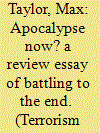

|
|
|
| 2 |
ID:
074608
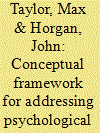

|
|
|
|
|
| Publication |
2006.
|
| Summary/Abstract |
A conceptual framework is presented for addressing psychological issues in the development of the terrorist. In particular, the authors suggest that viewing terrorism as a process may lead not only to better conceptual development in analyses of the terrorist, but may also lead to the development of more practical and efficient counterterrorism initiatives. Additionally, viewing terrorism in this way may finally lead to the formation of a clear and unambiguous position for psychology within an interdisciplinary approach to analyses of both terrorism and the terrorist.
|
|
|
|
|
|
|
|
|
|
|
|
|
|
|
|
| 3 |
ID:
099822
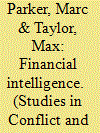

|
|
|
|
|
| Publication |
2010.
|
| Summary/Abstract |
The harvesting of financial intelligence by law enforcement and intelligence services through various forms of surveillance is now so prevalent that it has become a core feature of contemporary security practice. Not surprisingly, concerns have been raised regarding the intrusive nature of financial intelligence collection and the emerging challenges posed to liberty. This article, whilst written primarily from a UK perspective, considers the trade-offs that inevitably emerge when liberty and security collide. Above all it argues that such measures are a necessary consequence of a changing security environment and that effective counter measures inevitably come at a price. The value added from data surveillance by the state, when lawfully sanctioned, audited and regulated are in the interests of public safety and national security, deemed a price worth paying.
|
|
|
|
|
|
|
|
|
|
|
|
|
|
|
|
| 4 |
ID:
154975
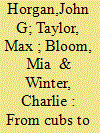

|
|
|
|
|
| Summary/Abstract |
Using the Islamic State in Iraq and al-Sham (ISIS) as a case study, we explore the process by which children evolve from novice recruits to fully fledged members of a violent extremist movement. From currently available data, we propose six stages of child socialization to ISIS—Seduction, Schooling, Selection, Subjugation, Specialization, and Stationing. Furthermore, we explore this process in the context of “Community of Practice” (COP) as developed by Wenger and Lave. COP models highlight how newcomers learn and pass through degrees of involvement from the periphery of an organization to the inside. In subsequent research, Hundeide highlighted how “contracts of deep commitment” and “conversion” constitute important social and psychological elements of communities of practice. We regard such qualities as intrinsic to children's involvement in ISIS. We conclude with implications drawn from the disengagement and reintegration experiences of former child soldiers in other contexts.
|
|
|
|
|
|
|
|
|
|
|
|
|
|
|
|
| 5 |
ID:
072987
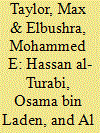

|
|
|
|
|
| Publication |
2006.
|
| Summary/Abstract |
This research note explores the events and circumstances surrounding Osama bin Laden's stay in Sudan from 1991 to 1996. In particular, it discusses the role that the Sudanese politician, Hassan al-Turabi may have played in the development of bin Laden and al Qaeda. It draws particular attention to the role of the Popular Arab and Islamic Congress (PAIC) in the emergence of a distinctive form of Radical Islam and offers a preliminary discussion of the emergence of particular qualities of al Qaeda ideology.
|
|
|
|
|
|
|
|
|
|
|
|
|
|
|
|
| 6 |
ID:
133535
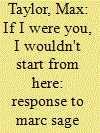

|
|
|
|
|
| Publication |
2014.
|
| Summary/Abstract |
Have you heard the story about the Englishman lost in an Irish mist trying to find the route to Limerick? He reaches a country crossroads, and asks an old man for directions; after much thought the old man's answer is, "If I were you I wouldn't start from here." From Sageman's account, you might in many ways infer that's the story of much contemporary terrorism research, and is, it seems to me, the unstated fundamental assumption behind his paper-if we had the freedom to start from scratch, if we were designing an area of study to investigate how violence is used to do things to influence political decision making, we'd probably want to conduct ourselves in a different way than we have. But we are where we are. Whether we like it or not, in studying terrorism and the terrorist, we engage with a world in which governments, officials, and politicians largely define the agenda (and keep changing it), set the rules for risk tolerance, and to a large extent control the money and through the choices they make direct research agendas.
|
|
|
|
|
|
|
|
|
|
|
|
|
|
|
|
| 7 |
ID:
178911
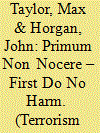

|
|
|
|
|
| Summary/Abstract |
This medical epithet seems to offer solid guidance for terrorism researchers and counterterrorism practitioners when thinking about the ethical implications of their work—to rephrase it, whatever you do, just don’t make it worse. It seems an appropriate guiding principle1 because although terrorism research remains even now largely dominated by theory (which, in pursuit of understanding, can seem removed from reality), the essence of terrorism lies in real-world practice—the actions of terrorists, and the concomitant actions of security, law enforcement and government agencies in response. And however we conceptualize these forces, they are in some measure reciprocally related, either reactively (in a terrorist event, or in responding to a terrorist event) or proactively (in preemptive initiatives). Such responses have consequences that impinge on individuals and society, and as such give rise to essentially moral questions about right and wrong, about harm and the consequences of behavior for others. The practitioner, researcher and terrorist therefore are all in some way participants in and subject to an appreciation of harm in a dynamic and complex moral decisional calculus. Of course, the idea of harm is itself complex; how much harm, and to whom or what? The researcher, society, government, employer, organization, family, tribe or even a concept like democracy, or the future? The idea of choice is also implied in that complex calculus; for whilst with hindsight a logic to choices can be discerned, in reality at the time of choice, there are often a number of possible alternative behavioral avenues to follow.
|
|
|
|
|
|
|
|
|
|
|
|
|
|
|
|
| 8 |
ID:
021731
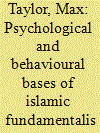

|
|
|
|
|
| Publication |
2001.
|
| Description |
37-71
|
|
|
|
|
|
|
|
|
|
|
|
|
|
|
|
| 9 |
ID:
182994


|
|
|
|
|
| Summary/Abstract |
The paper argues that in order to understand the events of 6 January we must look at events from a range of perspectives, two of which are identified—the narrow focus of a comparison of a linguistic analysis of the speech and its context, and the broader social and cultural context of a changing sense of American National Interest. It suggests that to understand the events of 6 January we need to conceptualise them as the product of a complex process where both aggregate and specific influences seem relevant, but whilst both offer necessary explanations neither in themselves provide a sufficient explanation of the event. The concept of affordance is suggested to perhaps provide the glue that may bind these and other influences together to facilitate the violence.
|
|
|
|
|
|
|
|
|
|
|
|
|
|
|
|
| 10 |
ID:
169935
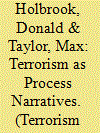

|
|
|
|
|
| Summary/Abstract |
Terrorism is a highly irregular form of crime where multiple factors combine to create circumstances that are unique to each case of involvement, or attempted involvement, in terrorist violence. Yet, there are commonalities in the way in which efforts to become involved unfold as processes, reflected as sequential developments where different forces combine to create conditions where individuals seek to plan acts of violence. The best way to frame this involvement is through analytical approaches that highlight these procedural dimensions but are equally sensitive to the nuances of each case. Analysing pre-arrest media usage of convicted terrorists, this paper focuses on the ways in which belief pathways and operational pathways interact in five distinct cases of terrorist involvement in the UK in what are termed “process narratives.”
|
|
|
|
|
|
|
|
|
|
|
|
|
|
|
|
| 11 |
ID:
120327
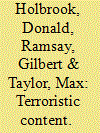

|
|
|
|
|
| Publication |
2013.
|
| Summary/Abstract |
In this article we offer a first attempt at providing a set of universal grading criteria for determining on what basis, and how far, an item of discursive content can be considered "terroristic." In doing so, we draw loosely on the existing COPINE scale for child abuse images. The scale described in the article is not intended to reflect actual risk of engagement in terrorist violence, nor is it intended to have evidential validity in relation to offenses in certain jurisdictions relating to "terrorist publications." Rather, by formalising assumptions which seem already to be latent in the literature on terrorist use of the Internet, it aspires to serve as a starting point for a more methodologically coherent approach to relationships between content-particularly online content-and terrorism.
|
|
|
|
|
|
|
|
|
|
|
|
|
|
|
|
|
|
|
|
|